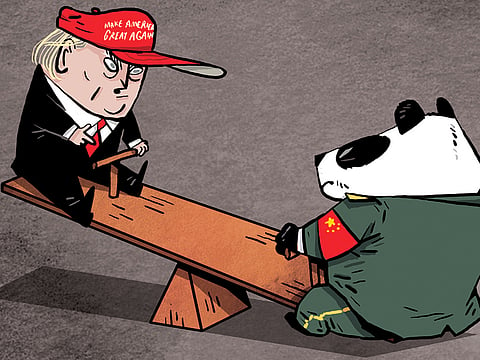Global economy will not survive US-China tension
Both countries must work out their differences to avoid another world economic meltdown

In the midst of unprecedented pandemic, which devastated the global economy, a major unnecessary political crisis between the United States and China is looming, threatening to derail the cautious efforts by countries around the world to restore some sort of normal life.
The new tension between the two world giants centers on the status of Hong Kong. On Thursday, China approved a new security law for the semi-autonomous city that could, as per Western governments, erode the high degree of autonomy Hong Kong enjoyed under a “one country, two systems” regime since it was returned by the British to Chinese rule in 1997.
The US government says the new law will impose China’s authority on the Asian financial hub and undermine its independent judiciary.
Washington claims China intentionally downplayed the crisis when it first started earlier this year. China rejects the allegations saying American officials are looking for a scapegoat to cover up their initial poor response to the COVID-19 outbreak in the USGulf News
Details of the law are expected to be drawn up in the coming weeks but it is not to be enacted before September. However, US President Donald Trump has promised strong action over Hong Kong, which could range from sanctions on Chinese officials to revoking the city’s special trading status with the US. More than 1,300 American companies have offices in the city, providing about 100,000 jobs.
Also Read: A grim reminder of the pandemic
US Secretary of State Michael Pompeo told Congress “no reasonable person can assert today that Hong Kong maintains a high degree of autonomy from China, given facts on the ground.”
In reaction to his statement, China made it clear that it would take “necessary countermeasures to any foreign interference” into what it says is an internal affair. Hong Kong officials too maintain that there is no threat to the city’s autonomy.
“The law will not affect the rights and freedoms enjoyed by Hong Kong residents,” the city’s leader Carrie Lam said in a statement welcoming the Chinese decision, which is supposed to focus on “banning subversion, secession, terrorism and foreign interference.”
The looming crisis comes while tension between the two countries is already high following the repeated US statements blaming China for the rapid spread of the coronavirus. Washington claims China intentionally downplayed the crisis when it first started earlier this year.
China rejects the allegations saying American officials are looking for a scapegoat to cover up their initial poor response to the COVID-19 outbreak in the US. Global markets and demand for fuel have suffered unexpected setbacks during the week due to fears the tension may escalate further.
As the world struggles to sort out its messy affairs, amid collapsing markets and mass job losses, it is critical that the two economic superpowers work together to support these efforts. The global economy cannot and will not survive two crises at the same time: the coronavirus and the US-China rift.



